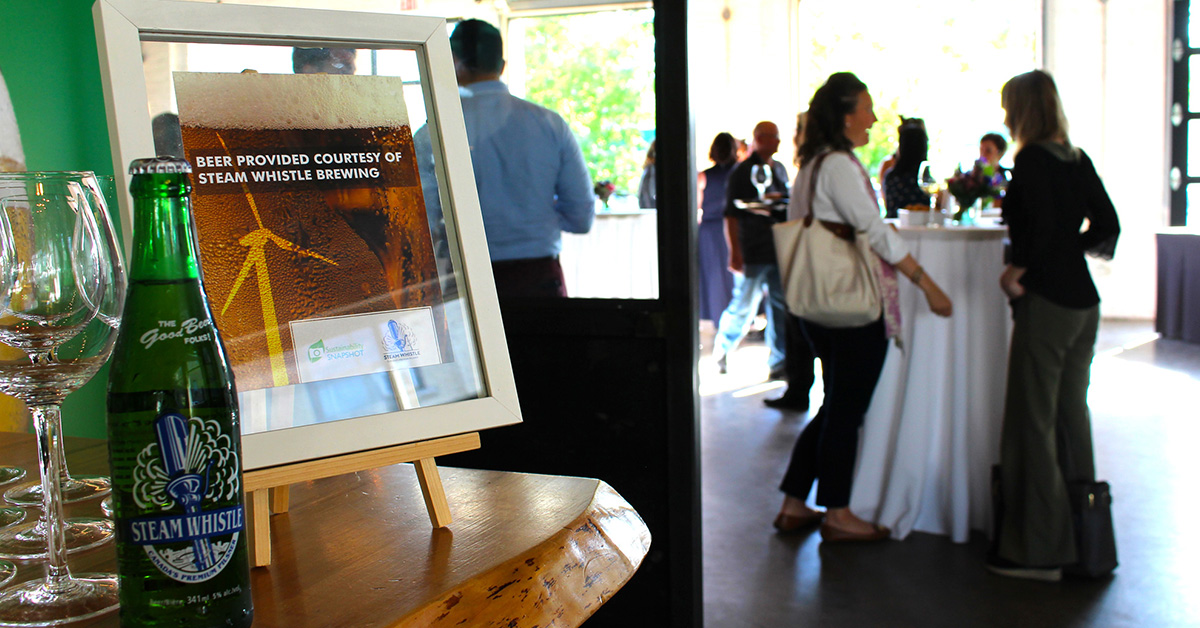Sustainability Snapshot: The intersection between food supply and sustainability
[getsocial app=”sharing_bar” ]
Currently contributing to a third of global greenhouse gas (GHG) emissions, the food and agricultural industries are expected to grow this impact in the years ahead. In addition, by 2050, it’s expected we’ll have to increase food production by 50% to feed the world’s population. At the same time, these industries face the challenge of decreasing productivity due to the direct impacts of climate change.
For these reasons and others, it is critical to watch how the food supply and agricultural industries manage their ever-changing environments. With pressure comes performance and innovation—it’s often what causes leading organizations to pull ahead.
On June 14, 2018, Bullfrog Power gathered speakers from leading organizations—Unilever Canada, Burnbrae Farms and Just Food—within the industries who are changing the game by innovating in sustainability. The organizations are also linked by their commitment to reducing their impact through renewable energy. Below are highlights from the evening’s presentations.
Unilever’s Sustainable Nutrition Manifesto
Presented by Devin Borst, Senior Brand Manager for Ice Cream, and Kristina Burgener, North American Knorr Innovation Manager at Unilever Canada. Unilever Canada has been choosing green energy with Bullfrog Power for its Canadian operations since 2011.
 In 2010, Unilever launched its Sustainable Living Plan with the ambition to double the size of the business while improving livelihoods and reducing its environmental impact by half. As a part of this journey Unilever decided to evolve its food strategy and the Sustainable Nutrition Manifesto was born. Its vision was to create Food that tastes good, that does good and that doesn’t cost the earth. Unilever would deliver this vision through a strategy of producing nutritious food with less impact on the environment and less waste, benefitting the livelihoods of food producers, and improving the nutrition and wellbeing of consumers.
In 2010, Unilever launched its Sustainable Living Plan with the ambition to double the size of the business while improving livelihoods and reducing its environmental impact by half. As a part of this journey Unilever decided to evolve its food strategy and the Sustainable Nutrition Manifesto was born. Its vision was to create Food that tastes good, that does good and that doesn’t cost the earth. Unilever would deliver this vision through a strategy of producing nutritious food with less impact on the environment and less waste, benefitting the livelihoods of food producers, and improving the nutrition and wellbeing of consumers.
Applying the Sustainable Nutrition Manifesto regionally
One of the biggest challenges for multinational organizations in the food industry is applying strategies set at the global level locally within different regions. Ultimately, people in different regions have a different way of interacting with brands; additionally, they care about different things when it comes to their food.
How did Unilever bring its Sustainable Nutrition Strategy to life for its brands in Canada? With respect to its core food brands, which include Hellmann’s mayonnaise, Knorr brands, and Becel margarine products, Unilever began to evolve how consumers experienced the brand (through its products as well as its brand campaigns).
The organization had been using the campaign concept: What’s for Dinner? successfully for years as an in-store strategy to help bridge together a very complex portfolio. Through What’s for Dinner?, Unilever was able to introduce various recipes to consumers to help them find ways to use Unilever products in new and different ways.
However, when the Sustainable Nutrition Strategy rolled out at the global level, the organization realized that What’s for Dinner? needed to evolve to mean something more. In response, the organization launched a new strategy, Meals that Matter, in 2018.
Meals that Matter helped explain why every single meal customers cook with their families is important, why it’s critical to know what’s on your plate, what ingredients are in the products that you’re buying in the store and where they come from.
The program was born from the insight that—for the first time ever—Canadian millennial consumers are spending more money on delivery and take-out than on groceries. If Unilever Canada can encourage Canadians to cook one more meal with their families each week through the Meals that Matter program, they can drive a significant impact in the lives of Canadians.
Sustainable sourcing with Hellmann’s
 Since 2007, Hellmann’s has been featuring the Real Food Movement campaign, an awareness campaign that helps Canadians become more educated about where their food comes from. Year over year, the campaign has been delivering strong financial results, demonstrating that sustainability can pay off.
Since 2007, Hellmann’s has been featuring the Real Food Movement campaign, an awareness campaign that helps Canadians become more educated about where their food comes from. Year over year, the campaign has been delivering strong financial results, demonstrating that sustainability can pay off.
Key to the campaign is highlighting the best of the best of Hellmann’s suppliers. All of the canola in Hellmann’s mayonnaise is sustainably sourced in Canada; the organization also uses 100% cage-free eggs from Burnbrae Farms, Canada’s largest egg company, which is also bullfrogpowered.
To continue driving Hellmann’s Real Food Movement, the organization developed the Hellmann’s Blue Ribbon Farm Program. A Blue Ribbon Farmer is a Hellmann’s supplier that:
- works to improve the sustainability of their farm;
- is compliant with the requirements of the Unilever Sustainable Agriculture Code; and
- is actively implementing initiatives and utilizing new technologies to improve farming practices.
Further, Blue Ribbon Farmers want to share their work with the world by actively promoting sustainable agriculture; stories on sustainable farming are made publicly available on Hellmann’s websites, social media sites and more. Through the Blue Ribbon program, Unilever is hoping to encourage Canadian households to make better choices—and other organizations in the industry to adopt similar sustainable sourcing programs.
Social responsibility at Burnbrae Farms
Presented by Dave Chapman, Managing Director, Egg Shell Products and Sustainable Business Initiatives at Burnbrae Farms. Burnbrae Farms has been a Bullfrog Power customer since 2009, purchasing 100% green electricity for its Free Run Omega 3 Eggs, Naturegg Simply Egg Whites, and Nestlaid Egg lines.
Burnbrae Farms is Canada’s largest vertically integrated egg company, supplying retail, food service and industrial chains. With decades of family farm heritage, Burnbrae Farms has always placed a high value on social responsibility, even long before that was a commonly used term.
 A Canadian, family-owned business dating back to the late 1800s, Burnbrae Farms operates under the mission “Eggs for life.” The organization recognizes the current challenges facing the food industry: trying to feed our country with only two per cent of population involved in farming, while modern farming practices are increasingly under scrutiny. To this end, the organization strives to focus on the health of Canadians, protecting the environment, and the welfare of the animals under its care.
A Canadian, family-owned business dating back to the late 1800s, Burnbrae Farms operates under the mission “Eggs for life.” The organization recognizes the current challenges facing the food industry: trying to feed our country with only two per cent of population involved in farming, while modern farming practices are increasingly under scrutiny. To this end, the organization strives to focus on the health of Canadians, protecting the environment, and the welfare of the animals under its care.
One interesting recent example of their social responsibly efforts is The Eggshell Project. With a focus on the environment and waste reduction in mind, Burnbrae Farms identified an area of its business that was both a concern and an opportunity: egg shell waste.
With the health benefits of eggs being increasingly embraced by consumers, egg demand and production has been on the rise. Increased production of processed egg products and packaged egg whites was literally creating tonnes of egg shell waste. It was costing the organization hundreds of thousands of dollars a year to take the used eggshells to landfill; and it was also producing 7,000 tonnes of CO2.
Burnbrae Farms saw the opportunity to significantly reduce its impact on the environment. The organization stopped sending eggshells to landfill and instead worked with local waste providers to send them to compost. Eggshells are rich in calcium—and farmers are able to use the calcium-rich compost as excellent fertilizer. As a result, Burnbrae Farms was able to not only reduce its total landfill waste by 2,400 metric tonnes but also its GHG emissions by 7,000 tonnes.
In the future, Burnbrae Farms will continue to look for more ways to re-purpose eggshell waste, with the ultimate goal of potentially turning this waste into a revenue stream and contribute to the circular economy.
A local perspective: sustainable farming in Ontario with Just Food
Presented by Moe Garahan, Executive Director, Just Food. Just Food recently partnered with Bullfrog Power and Beau’s Brewery to install a 10 kW roof mounted solar system that is helping lower the costs of Just Food’s sustainable farming education and food equality initiatives.
Just Food is a community and economic development non-profit organization in the Ottawa region. The organization is taking up a food systems-approach to create vibrant, just, and sustainable food and farming systems. Founded 15 years ago, Just Food is working to change the way we think about farming. In her presentation, Garahan answered the following questions:
Where can the future of farming happen?
The future of farming can exist within residential areas, including ecologically protected areas. For example, Just Food is located on 150 acres in Ottawa’s National Capital Commission Greenbelt. It’s not alone; more than 1,300 registered farms currently exist within Ottawa’s boundaries. Just Food wants to demonstrate that Canadians can build vibrant food and farming systems within our cities.
Local food should be defined through a tiered approach—where we consider region first, then province, and then country. This approach will help ensure our local food systems maintain community ownership, even as we also seek to trade more broadly.
Just Food is diligently working to educate Ontarians on where food comes from. The group leads the Community Gardening Network with 100 community gardens in Ottawa, as well as almost 40 school gardens and is working with partners across Ottawa within the newly formed Ottawa School Food Network to ensure that every child knows where food comes from, visits a farm, cooks good food meals and grows food in indoor and outdoor gardens.
What is “good food” and who is growing it?
The concept of “good food” needs to be redefined. Just Food’s concept of good food refers to food that is fresh or minimally processed, accessible, culturally relevant, as local as possible and affordable, not just for the buyer—but also financially viable for the farmer to grow. According to Just Food, good food is also ecologically grown in a way that replenishes the soil from which it comes.
The organization is also encouraging audiences to re-think their idea of the typical farmer. The average age of a farmer in Canada is 55+ and many farmers do not have a succession plan. At the same time, local food demand is rising above supply.
The range of new farmers will include new Canadians; young people who grew up on the farm but have moved into the city and want to continue farming on a part-time basis; young people who do not come from a farming background and people who are interested in getting involved in farming as a second career and others.
How can we make farming sustainable?
 A significant focus for Just Food is incorporating sustainable practices into the farming model. To this end, the organization has turned its farm in Ottawa into a demonstration site showcasing sustainable farming practices such as using solar energy. The solar project is a joint initiative between Bullfrog, Beau’s Brewery (a Bullfrog customer) and Just Food, whereby Bullfrog and Beau’s provided funding for the project. In addition to powering the site and reducing its electricity costs, the solar project has become a legacy project educating visitors on ways renewable energy and farming can complement each other. “I want to thank Bullfrog Power and Beau’s Brewery for their initiative and creativity as a partner to ensure the overall project could happen, all powered by solar,” said Garahan. “They were the first ones in on this legacy project which will have a massive impact in our region, with the added goal to encourage further sustainable, regional food systems work across the province and country.”
A significant focus for Just Food is incorporating sustainable practices into the farming model. To this end, the organization has turned its farm in Ottawa into a demonstration site showcasing sustainable farming practices such as using solar energy. The solar project is a joint initiative between Bullfrog, Beau’s Brewery (a Bullfrog customer) and Just Food, whereby Bullfrog and Beau’s provided funding for the project. In addition to powering the site and reducing its electricity costs, the solar project has become a legacy project educating visitors on ways renewable energy and farming can complement each other. “I want to thank Bullfrog Power and Beau’s Brewery for their initiative and creativity as a partner to ensure the overall project could happen, all powered by solar,” said Garahan. “They were the first ones in on this legacy project which will have a massive impact in our region, with the added goal to encourage further sustainable, regional food systems work across the province and country.”
To date, Bullfrog Power customers have supported more than 140 community-based green energy projects across Canada—including solar projects on schools and community co-ops and renewable projects with Indigenous Peoples.
In conclusion…
Presented by Noel Padilla, Manager, Sustainability Policy and Social Responsibility at OLG, presenting sponsor of the Sustainability Snapshot event.
In Padilla’s closing remarks, he stressed that corporations need to take action on the environment because consumers are now demanding a response from companies more than ever. OLG is seeing the results from its sustainability plan: the organization has reduced its power emissions by approximately 19,000 tonnes over a period of eight years and it has reduced its paper use by 27%. OLG has been a Bullfrog Power customer since 2008 and now chooses 100% green electricity for its PlaySmart and Prize Centres, digital signage and websites.
By choosing green energy for your company, you can reduce your carbon footprint, support the development of community-based green energy projects across Canada and set your brand apart in the marketplace. To learn more about green energy for your organization, visit bullfrogpower.com.
Want to contribute to the conversation? Share your thoughts and ideas on sustainable food supply or agriculture by contacting us today. We would love to feature your story in an upcoming white paper or e-communication. Contact business@
